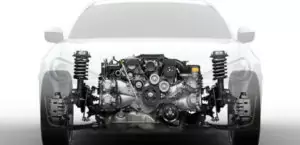The concern produced the 1.9-liter diesel engine F9Qt or F9Q 1.9 dTi from 1997 to 2003 and installed it on its most popular models, such as Megane, Scenic, and also the Volvo S40. Since 1998, a Common Rail version of this engine has been produced, which was distinguished by the dCi suffix.
F-series diesels also include: F8M, F8Q and F9Q dCi.
In 1997, a new 1.9-liter diesel engine debuted on the Megan and Scenic models. This unit was created on the basis of the F8Q pre-chamber diesel engine, similar in terms of working volume, but differed from it by the direct fuel injection system with the Bosch VP37 electronic injection pump. Otherwise, there is the same cast-iron block, an aluminum 8-valve cylinder head without hydraulic lifters, a timing belt drive and a turbocharger manufactured by Garrett or BorgWarner/KKK.
Already in 1998, a Common Rail version of this diesel appeared, and the index remained the same, and the suffix dTi was used to distinguish them for direct injection engines and dCi for the newer one.
The engine was installed on:
- Renault Clio 2 (X65) in 1999 – 2001;
- Renault Espace 3 (J66) in 1999 – 2002;
- Renault Kangoo 1 (KC) in 1999 – 2003;
- Renault Laguna 1 (X56) in 1998 – 2001;
- Renault Megane 1 (X64) in 1997 – 2003;
- Renault Scenic 1 (J64) in 1997 – 2003;
- Volvo S40 I (644) in 1999 – 2000 (as D4192T2);
- Volvo V40 I (645) in 1999 – 2000 (as D4192T2).
Specifications
| Production years | 1997-2003 |
| Displacement, cc | 1870 |
| Fuel system | direct injection |
| Power output, hp | 80 – 98 |
| Torque output, Nm | 160 – 200 |
| Cylinder block | cast iron R4 |
| Block head | aluminum 8v |
| Cylinder bore, mm | 80 |
| Piston stroke, mm | 93 |
| Compression ratio | 18.3 |
| Hydraulic lifters | no |
| Timing drive | belt |
| Turbocharging | yes |
| Recommended engine oil | 5W-30, 5W-40 |
| Engine oil capacity, liter | 5.9 |
| Fuel type | diesel |
| Euro standards | EURO 2/3 |
| Fuel consumption, L/100 km (for Renault Megane 2000) — city — highway — combined |
6.8 4.4 5.2 |
| Engine lifespan, km | ~400 000 |
| Weight, kg | 172 |
Disadvantages of the F9Qt (dTi) engine
- The Bosch fuel pump is very reliable, but at high mileage it is prone to leaks and air leaks due to loss of tightness. The seals in it age and collapse. Often there are failures of the electronic control unit and wear of the plunger pair.
- Saving on oil or a rare replacement of the air filter leads to wear on the turbine, which can start to drive oil even up to 150,000 km. This is a very common problem here.
- All diesel engines of this family are afraid of overheating and the gasket breaks here very often. The main danger is that sooner or later the cylinder head will crack from high temperatures.
- Also, these motors are prone to leaks of lubricant and antifreeze, and especially from the oil separator, contamination of the EGR valve, and regular electrical failures due to poor wiring.






